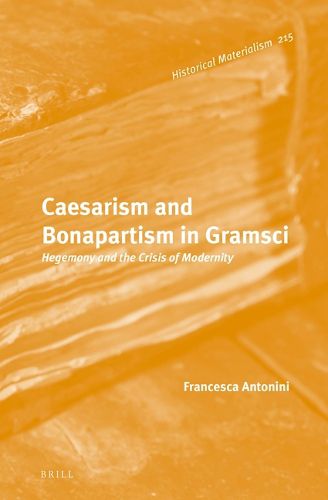Readings Newsletter
Become a Readings Member to make your shopping experience even easier.
Sign in or sign up for free!
You’re not far away from qualifying for FREE standard shipping within Australia
You’ve qualified for FREE standard shipping within Australia
The cart is loading…






Shortlisted for the Deutscher Memorial Prize 2021.
Winner of the prestigious ‘Giuseppe Sormani International Prize’ for works on Antonio Gramsci (Fifth edition, 2020).
In Caesarism and Bonapartism in Gramsci, Francesca Antonini offers a fresh insight into Antonio Gramsci’s thought. Building on the achievements of recent Gramscian scholarship, she investigates his usage of the concepts of Bonapartism and Caesarism, both in his pre-prison writings and in the Prison Notebooks. The Caesarist-Bonapartist paradigm relates crucially to Gramsci’s reflections on hegemony and on its transformations across the nineteenth and twentieth centuries. While this model is essential to Gramsci’s understanding of the interwar period and of the Fascist regime in Italy, it also sheds a meaningful light on other past and present scenarios, from the French Second Empire to the USSR of his time. Finally, yet importantly, Antonini’s analysis illuminates Gramsci’s approach towards the Marxian legacy.
See inside the book.
$9.00 standard shipping within Australia
FREE standard shipping within Australia for orders over $100.00
Express & International shipping calculated at checkout
Shortlisted for the Deutscher Memorial Prize 2021.
Winner of the prestigious ‘Giuseppe Sormani International Prize’ for works on Antonio Gramsci (Fifth edition, 2020).
In Caesarism and Bonapartism in Gramsci, Francesca Antonini offers a fresh insight into Antonio Gramsci’s thought. Building on the achievements of recent Gramscian scholarship, she investigates his usage of the concepts of Bonapartism and Caesarism, both in his pre-prison writings and in the Prison Notebooks. The Caesarist-Bonapartist paradigm relates crucially to Gramsci’s reflections on hegemony and on its transformations across the nineteenth and twentieth centuries. While this model is essential to Gramsci’s understanding of the interwar period and of the Fascist regime in Italy, it also sheds a meaningful light on other past and present scenarios, from the French Second Empire to the USSR of his time. Finally, yet importantly, Antonini’s analysis illuminates Gramsci’s approach towards the Marxian legacy.
See inside the book.